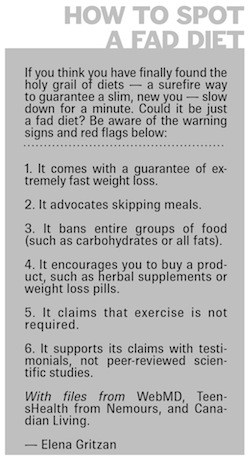At the beginning of each year, many people begin extreme plans to improve their physical health and appearance, often resorting to fad diets. Some of these diets are dangerous to physical health, while others simply provide misinformation to the public. Recently, another scientific study has confirmed that the reality of being healthy may be much simpler.
One popular fad diet was developed by P. J. D’Adamo in a 1996 New York Times bestseller, “Eat Right for Your Type.” The book’s premise is that the blood type of each individual indicates the dietary habits of their ancestors, and that tailoring dietary habits based on that blood type can promote physical health. There is plenty of anecdotal evidence that this diet promotes health. A group of researchers from the U of T Department of Nutritional Sciences in the Faculty of Medicine decided to address the lack of research on blood type diets.
 The January 15 study, “ABO Genotype, ‘Blood-Type’ Diet and Cardiometabolic Risk Factors,” was published in PLOS One. The authors of the study divided over 1,400 young people by blood type, and instructed them to follow the appropriate diet for their blood type. The diet for the “ancestral” Type O, for example, contains plentiful animal protein, while the “agrarian” Type A is recommended to follow a vegetarian diet. Scores were assigned to the study participants based on their adherence to the relevant program.
The January 15 study, “ABO Genotype, ‘Blood-Type’ Diet and Cardiometabolic Risk Factors,” was published in PLOS One. The authors of the study divided over 1,400 young people by blood type, and instructed them to follow the appropriate diet for their blood type. The diet for the “ancestral” Type O, for example, contains plentiful animal protein, while the “agrarian” Type A is recommended to follow a vegetarian diet. Scores were assigned to the study participants based on their adherence to the relevant program.
The results were surprising: greater adherence to the diet program was positively correlated with better cardiometabolic health. Type A subjects did enjoy increased health when they followed their diet program, but the same was true if they followed any other. This was common to all of the groups: for all participants, increased adherence to any diet program was an indicator for increased health. The positive effects included healthy waist circumference, blood pressure, and cholesterol levels.
The study claims that “adherence to a certain ‘blood type’ diet is associated with a favorable profile for certain cardiometabolic risk factors in young adults, but these associations were not related to an individual’s abo blood group.” The study does not support the blood type diet hypothesis, although it does explain the anecdotal evidence for it. Each of the diets in the study, regardless of blood type, promotes good dietary habits.
Despite the preponderance of allegedly “scientific” fad diets, the actual message of science is simple: healthy eating, exercise, and ample sleep will promote health — and that has never been a fad.


